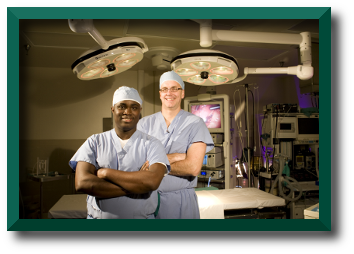Endoscopy
Endoscopy is a minimally invasive procedure that Great Lakes Surgical Associates performs as a diagnostic tool to assess the interior surfaces of an organ by inserting a tube into the body. Endoscopy is a vehicle for minimally invasive surgery, and allows our professionals to take biopsies and retrieve foreign objects, while minimizing recovery time and pain for our patients. Endoscopy involves the use of an instrument that may have a rigid or flexible tube and can provide images for visual inspection and photography. The procedures that our surgeons perform are relatively painless, and in the worst case scenarios area associated with mild discomfort.

Dr. Cudjoe and Dr. Smith can also perform a very common procedure for our patients called Upper endoscopy. This is an outpatient procedure in which the interior of the upper digestive system is examined. This procedure is commonly used to diagnose causes of Abdominal or chest pain, nausea and vomiting, heartburn, bleeding, swallowing disorders, ulcers, tumors, and inflammation. Upper endoscopy is more accurate than X-rays for detecting abnormal growths and for examination of the interior of the upper digestive system.
Endoscopy can also involve:
- The gastrointestinal tract (GI tract); Esophagus, stomach and duodenum (esophagogastroduodenscopy), Small intestine, Bile duct
- The respiratory tract, the nose (Rhinoscopy), the lower respiratory tract (Bronchoscopy)
- The urinary tract (Cystoscopy)
- The female reproductive system; the cervix (Colposcopy), the uterus (hysteroscopy), the fallopian tubes (Falloscopy
- Normally closed body cavities (through a small incision), the abdominal or pelvic cavity (Laparoscopy), the interior of a joint (Arthroscopy), organs of the chest (Thoracoscopy and Mediastinoscopy)
- During Pregnancy; the amnion (Amnioscopy), the fetus (Fetoscopy)
- Panendoscopy (or triple endoscopy) Combines laryngoscopy, esophagoscopy, bronchoscopy
Colonoscopy
Everyone 50 and older should schedule to have a colonoscopy, 90% of colon cancers occur in this age group. Although colon cancer is also most recommended for people with a family history of the disease, it is important to remember that most of those diagnosed have no family history of colon cancer at all.
 Colonoscopy tests for, and can also prevent, colon cancer by examining the entire colon by means of a safe and painless outpatient procedure. A colonoscopy detects more than 95% of early colon cancer, making colon cancer a treatable cancer, and helping to prevent colon cancer deaths by early detection. If the colonoscopy detects a polyp, it is easily removed, painlessly, during the test in order to prevent it from developing into cancer. A colonoscopy is recommended every 10 years. Great Lakes Surgical Associates have performed many colonoscopies, helping patients detect early onset of colon or other similar cancers at an early, treatable stage.
Colonoscopy tests for, and can also prevent, colon cancer by examining the entire colon by means of a safe and painless outpatient procedure. A colonoscopy detects more than 95% of early colon cancer, making colon cancer a treatable cancer, and helping to prevent colon cancer deaths by early detection. If the colonoscopy detects a polyp, it is easily removed, painlessly, during the test in order to prevent it from developing into cancer. A colonoscopy is recommended every 10 years. Great Lakes Surgical Associates have performed many colonoscopies, helping patients detect early onset of colon or other similar cancers at an early, treatable stage.
Colon Cancer is the third most common cancer in the USA, 1 in 20 adults are diagnosed with the disease. This means there is a 1 in 10 chance that you or your spouse will become afflicted with it if it is not decreased by pre-emptive intervention and screening. With the early detection by screening colonoscopy, this cancer is extremely preventable because it in most cases begins in the dysplastic tissue of an adenomatous polyp which may be present in the colon for months or even years before the actual cancer develops. If through colonoscopy screening, your treatment provider finds a polyp, it can be removed before becoming malignant, and in most cases will prevent cancer from developing.
Colorectal cancer is the leading non-smoking related cancer killer in Americans, is the third most common type of cancer and the second leading cause of cancer deaths. These statistics signify unnecessary deaths. Colon cancer is mainly preventable, and if diagnosed early, virtually always curable with surgery alone.
